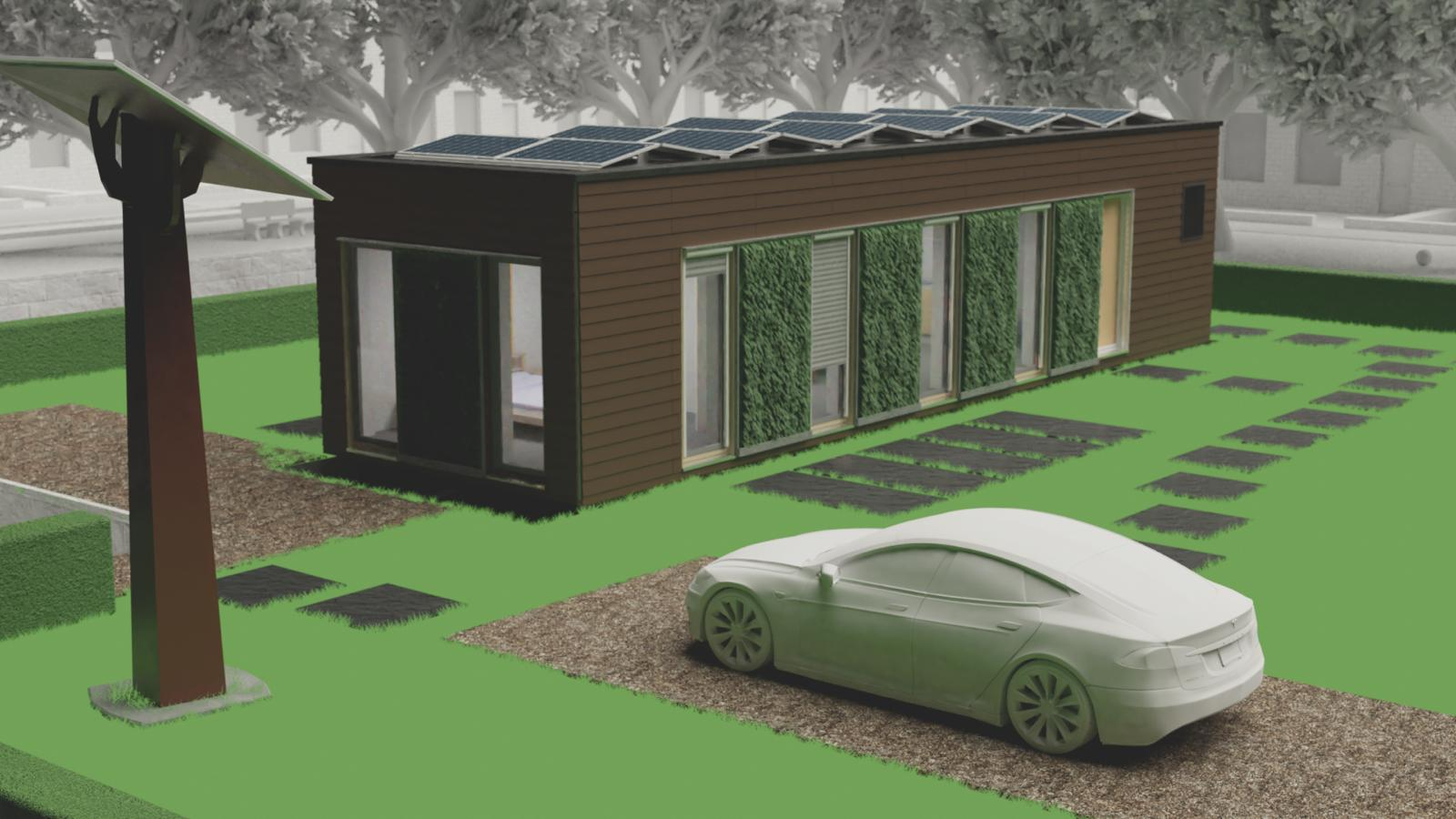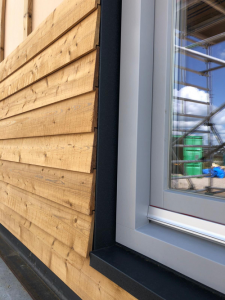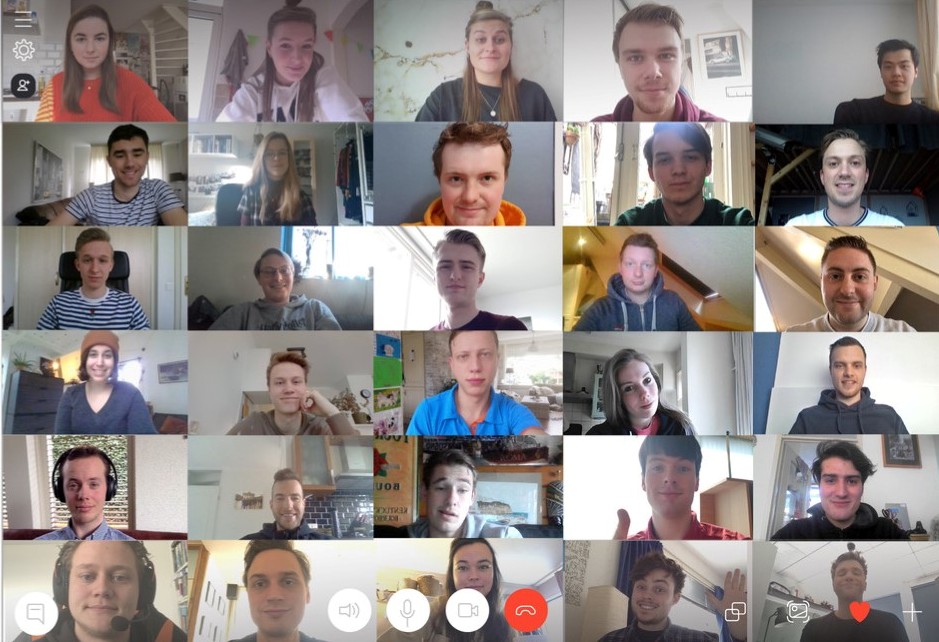Meet Celcius: A Sustainable Home that Reflects the Students Who Built It
Friday, October 23, 2020
Three years ago, a group of students from the Netherlands focused on the concept of circularity in their entry to the U.S. Department of Energy Solar Decathlon® competition. Their entry, Selficient, showcased the benefits of a home designed to be endlessly recyclable, growing and reconfiguring to adapt to the homeowners’ needs at every stage in their lives. Selficient earned second place in the Market Potential Contest and seventh place overall.
Fast-forward to 2020. A new team from Hogeschool Utrecht (HU) University of Applied Science in the Netherlands is competing in the Solar Decathlon 2020 Build Challenge. Inspired by HU’s 2017 team, the new Netherlands team is further developing the concept of a house that has “Circular, Eye-opening, Limitless, Community, Innovative, Unconventional and Self-sufficient” (CELCIUS) as its building blocks. Together, Team Celcius is building a next-generation home that reflects these core values.

This computer rendering of the Celcius house represents the base unit that the HU team is building to compete in Solar Decathlon 2020. Because every component is interchangeable, every room scalable, and every pipeline movable, a target customer can begin living in this relatively simple version of the home and upgrade it over time.
Redesigning the Wheel
Although Team Celcius does not have any returning students from the 2017 competition, several alumni from the Selficient team offered to provide guidance on the new project. The Selficient competition alumni emphasized the need to get university and partner support. Because HU believes that a challenge-based education with multidisciplinary teams is the most impactful way to influence student development, the board of directors agreed to make funds available for Team Celcius.
“In the beginning, we contacted at least 80 or 85 partners with our ideas,” said Arnoud Draijer, a co-project manager for Team Celcius. “At least half responded with offers to provide supplies or expertise. You really need that support to start. If not, you go from scratch.”
The Celsius team didn’t want to reinvent the wheel, but it did need to redesign the founding Selficient concept to comply with the evolving competition rules. Whereas Solar Decathlon 2017 took place in Denver, Colorado, at a location that allowed for larger building footprints, the Solar Decathlon 2020 Build Challenge introduced new size restrictions and a local build option that Team Celcius had to strategically rethink.
 |
| Both Selficient and Celcius incorporated the Suteki exterior paneling system, which does not require skilled framers to install. |
“To work within the 2020 rules, we had to create kind of a tiny home,” said Arnoud. “We wanted to make an adaptable house with chambers and rooms you can add, but for the competition, we had to keep it simple by presenting the base unit alone.”
This strategy allowed Team Celcius to continue building on the foundational idea of Selficient—LEGOs. The simplicity of the LEGO approach fit with the team’s desire to create something that anyone can put together with an instruction book.
The team decided to use the Suteki PowerBuild System, the same supplier that provided exterior panels for Selficient, to ensure a simple assembly. Consisting of engineered timber frames and carbon steel connectors, the Suteki system minimizes the overall impact of the project by using sustainably harvested wood, reducing transportation, and allowing homeowners to build out or size down as needed. In fact, the home’s design can range from a starter home with just the base unit up to a five-story building.
“We have a lot of different systems from various suppliers, but they all connect in a way that functions as one whole system,” said Arnoud. “We created our own website tool to control the house. For example, our insulation reduces the demand on our heating pump so it can have plenty of hot water and energy from the solar panels and still function off grid with the battery.”
Rethinking Structures
Just like the house itself, the students wanted to rethink their team structure for this competition. Initially, Team Celcius worked within a straightforward hierarchy where students from various disciplines worked on a team. Each team’s leaders then reported up to one project manager who had the final say in decisions.
“Eventually, we realized that this old structure was not what we wanted because it didn’t fit with our culture,” said Arnoud. “We wanted to create a team environment in which everyone would work together toward one goal, which is the Celcius concept. We want to not only be ‘Eye-opening’ in designing the house, but also through the way of working together within the team.”
The team’s roughly 60 members represent students in 11 different disciplines, including built environment, communications, finance, business, law, and system techniques. Arnoud believes that bringing together different mindsets is what makes this team strong.
“You do need a bit of hierarchy, but it’s most important that everybody can say what they think. We want to hear every opinion,” said Arnoud. “We wanted to decide everything as a whole group, so almost every decision has been made with input from all of our members.”
Representing Their Potential
Team Celcius is close to completing construction of the Celsius base model at Gemeente Amersfoort, a local municipality that was looking to build a sustainable neighborhood called De Nieuwe Stad. The students plan to travel to Golden, Colorado, in April 2021 for the Solar Decathlon Competition Event, featuring 2020 Build Challenge and 2021 Design Challenge teams. However, their house will remain in the Netherlands as a local build.
“I think it will be challenging to impress the jurors without actually taking them inside the home we built,” says Arnoud. “Still, there are also some benefits of going to Colorado without transporting the house, not to mention competing alongside the Design Challenge participants as well. In the end, the world gives you challenges, and you learn to work with those. I always look on the bright side of life and hope our work reflects that.”
Circular, Eye-opening, Limitless, Community, Innovative, Unconventional and Self-sufficient. Those core principals have come to represent Team Celcius as much as their competition house.

